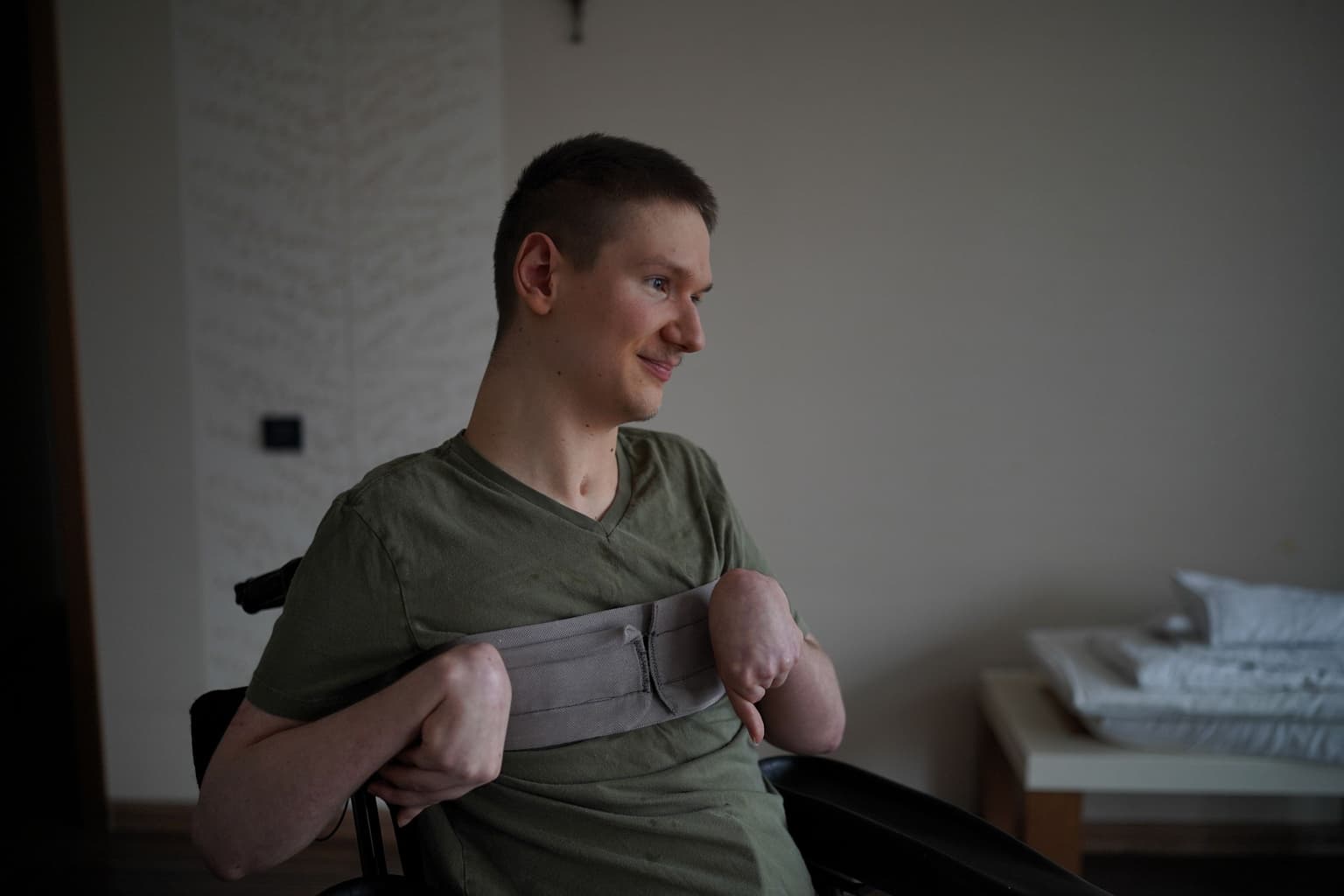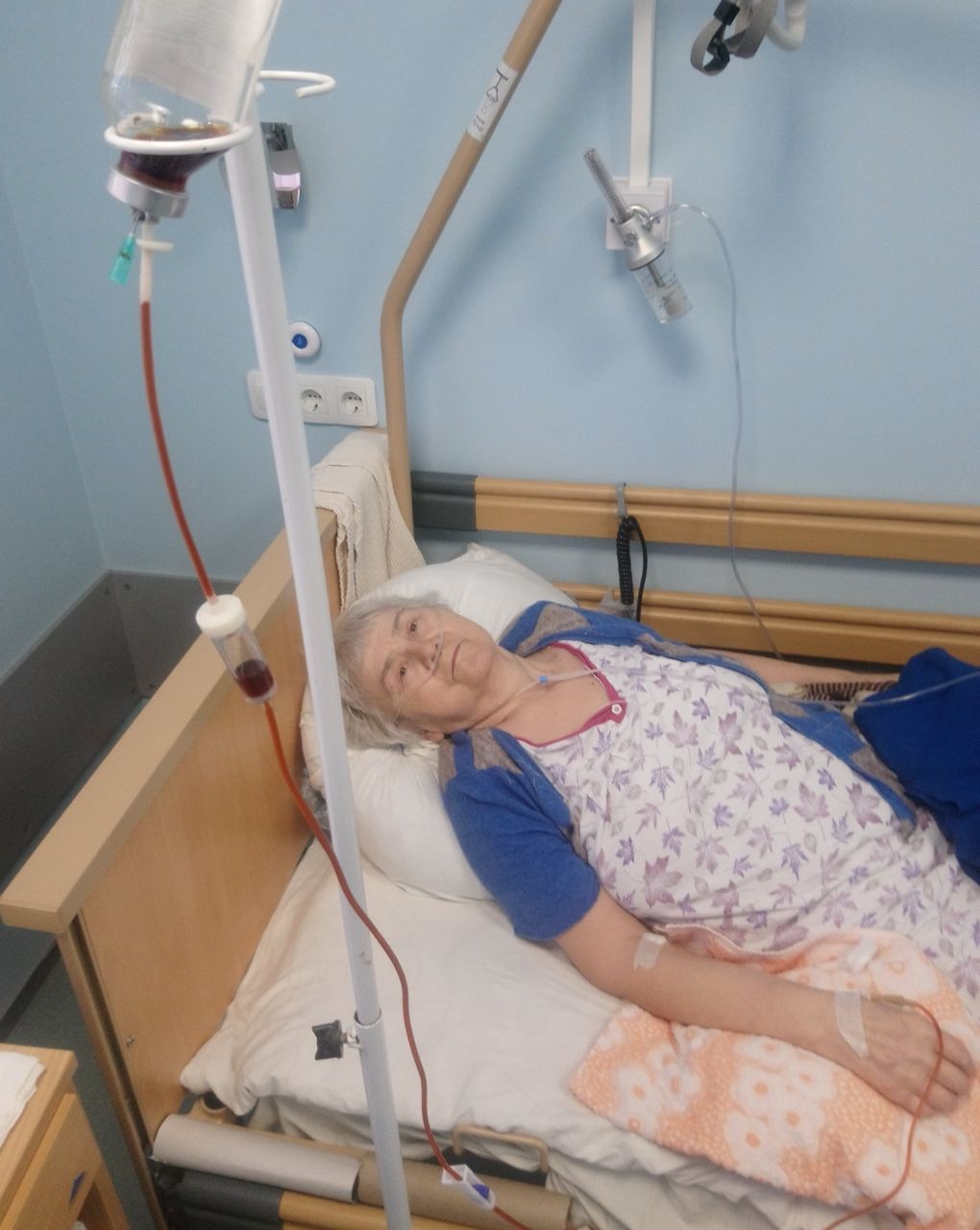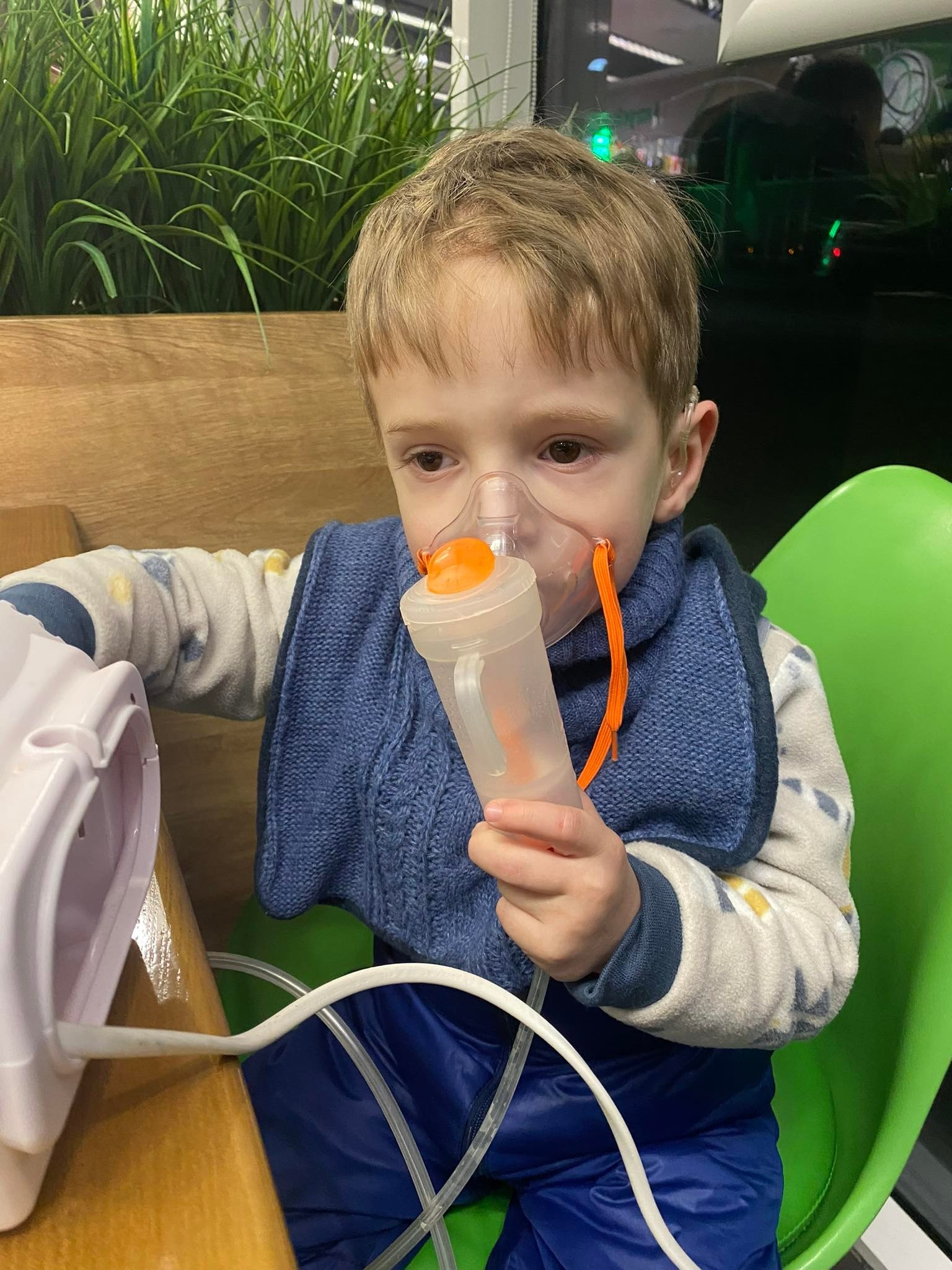Harder than ever: How power outages affect people with disabilities in Ukraine

On Dec. 18, Kyiv resident Tetiana Venhlinska was without power at home for 10 hours straight.
The blackout was imposed following another large-scale missile strike in a series of Russian attacks on Ukraine’s energy infrastructure.
For most Kyiv residents, the long power outage was likely a mere annoying inconvenience.
But for Tetiana Venhlinska’s mother, 75-year-old lung cancer patient Yeva Venhlinska, it was a life-and-death situation.
Yeva Venhlinska was diagnosed with advanced lung cancer in 2017. For the last three years, her life has depended on a stationary oxygen concentrator running non-stop to provide oxygen flow.
During blackouts, she uses portable versions of the device. But hours into the unexpectedly long power outage on Dec. 18, she only had around 30-40 minutes of battery left, according to her daughter.
That’s when Tetiana Venhlinska called a costly private medical company that took her mother to life-saving hospice.
Yeva Venhlinska's blood oxygen level had fallen to a critical 80% (95-100% is considered healthy) by the time she was connected to an oxygen device in the ambulance.
"That helped save her life," Tetiana Venhlinska says. "Otherwise, she would have just suffocated."
There were over 2.7 million people with disabilities in Ukraine as of June 2021, according to the State Statistics Service. That numbler includes nearly 164,000 children.
Russia's repeated attacks on energy infrastructure across Ukraine, which have killed dozens of people and caused electricity, water, and heating cut-offs, have made Yeva Venhlinska's life and the lives of millions of other people with disabilities and those who rely on special medical equipment, harder than ever.
"It affects them a lot," says Serhiy Rashchenko, the head of a rehabilitation center in Odesa whose son uses a wheelchair.
Rashchenko says that with no power, it has become more challenging for people with disabilities to take care of themselves, prepare food, exercise, and even leave the house since elevators can’t function without electricity.
"It's difficult not only physically but morally to withstand this pressure," Rashchenko says.
"When no one can help you, and you sit at home with no power, no water, nothing. I see suicidal thoughts all around," he adds.
Oxygen for mother
Tetiana Venhlinska says they had short power cuts at home at the early stage of Russia's full-scale invasion of Ukraine, which began on Feb. 24. They lasted from 30 minutes to two hours, she says.
Back then, Venhlinska raised money to purchase a car battery that kept her mother’s oxygen concentrator running for about two hours without electricity, in an attempt to prepare for "short-term emergencies." Aware of their situation, a local charity also donated a portable oxygen concentrator to the family. Working at minimum capacity, the portable concentrator can run for nearly seven hours, Venhlinska says. But the amount of oxygen her mother needs can drain the battery in just three, she adds.
Since Russia began targeting Ukraine’s energy system with missiles and drones in October, frequent lasting blackouts have become a real challenge for the family.
"The last three months have been a constant stress to us," Venhlinska says. "It is impossible to predict how long the blackout will last, whether it will be four, seven, or nine hours."
"Each time, we tried to save as much (oxygen) as possible because we don't know when the power will be back on."
Getting less oxygen also seriously affects her mother's overall health.
"Imagine that you don't have enough oxygen. You try not to breathe," Venhlinska says.
"She gets exhausted," she goes on. "(She) tries not to move much, freezes, and just waits (for the power to be back on)."
The night of Dec. 18 was the longest amount of time Venhlinska did not have electricity at home. It was two days after Russia unleashed its seventh large-scale attack on energy infrastructure across Ukraine.
The strike "significantly" increased electricity shortage in the system, which was substantial even before that, the state grid operator Ukrenergo said at the time. For Yeva Venhlinska, it was life-threatening.
Her daughter called the ambulance when the portable oxygen concentrator was already working at the lowest capacity, and had only 40 minutes until the battery ran out. Medical workers had to carry her down from the seventh floor of their apartment building since the elevator was not running.
"I paid for the private ambulance and private hospice that was ready to receive us in the middle of the night," she says.

According to Venhlinska, state-run hospices "accept people only by appointment," have long queues of patients waiting to get in, and their wards are already full of those "who need pain relief, who are in agony."
If the lengthy blackouts caused by Russian attacks continue, Venhlinska says she doesn't know what to do.
"Constant power cuts were very exhausting and painful for my mother. It was torture," she says.
‘Five times harder’
The everyday well-being of Rashchenko's son Mykhailo depends not only on the three people taking care of him but on the uninterrupted power supply at his home as well.
Back in 2015, then-16-year-old Mykhailo got into a road accident that led to multiple injuries, including nine bone fractures, that put him in a coma. His father says Mykhailo’s brain injury severely affected his health.
Since then, Mykhailo has used a wheelchair and has needed constant care. Rashchenko says his son can't chew on his own, so the food they make for Mykhailo needs to be ground in a mixer.
Physical exercises that involve special exercise machines twice a day are "critical" for his health, says Rashchenko.
Though it was tough, Rashchenko says the family managed to organize their lives so that
Mykhailo сould get the care that he needs.
Russia's fifth large-scale missile attack across Ukraine on Nov. 23, which damaged critical infrastructure and caused blackouts in much of the country and even neighboring Moldova, interrupted the Rashchenko family’s routine.
Following the attack, they did not have power for 70 hours straight, Rashchenko says.
"My parents live near the hospital, and they have power all the time," he says. "So I had to go to their place to prepare food (for Mykhailo) and go back home."
Since Mykhailo’s exercise machines require electricity to work, the family had to simulate exercising by stimulating his muscles with their hands, “which was not really effective," Rashchenko says.
During that time, Rashchenko says they could not bathe Mykhailo normally, since the water supply requires electricity. They also could not take him outside for a breath of fresh air since the elevator wasn’t working.
Rashchenko — who works with people with disabilities every day and whose rehabilitation center currently helps nearly 100 people in Odesa — says that those people with disabilities who have no one to take care of them should consider finding a way to flee abroad, at least for some time until Russian attacks on Ukraine’s energy infrastructure are over.
"It's always been hard, but now it's five times harder," he says.
Charging hearing aids
The four-year-old son of Kyiv Oblast resident Anna Sytnyk lost his hearing following a severe Covid-19 infection in 2020. Without hearing aids, he can barely hear anything now.
"A blackout is the worst thing that can happen to us because hearing aids need to be charged daily," Sytnyk says.
The devices that the little Roman uses for hearing can work for up to 12 hours.
"We take him to the kindergarten at 8 a.m., and he hears everything until 8 p.m. thanks to hearing aids," says Sytnyk. "Then they need to be charged."
Due to the illnesses that Roman endured as a little child, he also needs to use an electronic nebulizer for inhalation whenever he gets a cold and starts coughing, his mother says.

Three days after Russia unleashed another missile strike on Ukraine's civilian infrastructure on Nov. 23, six million people were still facing electricity shortages, according to President Volodymyr Zelensky.
Sytnyk’s family was among them. She says they did not have power for 68 hours straight. Back then, the family did not have a power generator and was unable to heat the house with two little children in it, not to mention prepare food and charge Roman's hearing aids. At that time, Roman also had a cough and needed to use his nebulizer to relieve the symptoms.
"You can not even imagine how difficult it was," Sytnyk says.
"We could never believe that in the 21st century, such a thing could happen. That we can be simply cut off from the world," she says.
Luckily, a gas station nearby that had power came to the family’s rescue.
There, Sytnyk says, Roman was able to use his nebulizer. She also left the expensive hearing aids at the gas station to charge for up to six hours so that her son could use them at kindergarten the next day.
Sytnyk says the gas station employees treated her nicely, understanding the difficulty of the family’s situation. She says that even when crowded, people at the gas station always let her and Roman use a plug socket to turn the nebulizer on.
Despite all the difficulties her family went through in the past months, Sytnyk says she "would rather stay without power for 100 or 200 hours" than have anything to do with Russia.
"Anything other than to pay in Russian rubles and to be with Russia," she adds.
___________________________________________________________________________________________________________________________
Note from the author:
Hi! Daria Shulzhenko here. I wrote this piece for you. Ever since the first day of Russia's all-out war, I have been working almost non-stop to tell the stories of those affected by Russia’s brutal aggression. By telling all those painful stories, we are helping to keep the world informed about the reality of Russia’s war against Ukraine. By becoming the Kyiv Independent's patron, you can help us continue telling the world the truth about this war.










